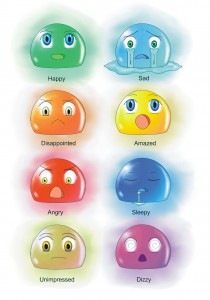 Recently an emailer asked me to discuss the difference between tone, mood, atmosphere. Interestingly from my perspective they also included the term attitude which I’ve always thought of as something completely separate. Tone is such a complex issue I’ll devote an entire blog post to it but mood, atmosphere and attitude should be easy enough to disentangle so here goes.
Recently an emailer asked me to discuss the difference between tone, mood, atmosphere. Interestingly from my perspective they also included the term attitude which I’ve always thought of as something completely separate. Tone is such a complex issue I’ll devote an entire blog post to it but mood, atmosphere and attitude should be easy enough to disentangle so here goes.
Let’s start with mood and atmosphere. To my mind, mood most commonly refers to your internal feelings – “I’m in the mood to see a movie” “Don’t talk to me, I’m in a foul mood“. Atmosphere, on the other hand, exists in a place – “There was a terrible atmosphere at the meeting” “The atmosphere in the control room was fraught with anxiety, taut as a wire-spring, coiled like a viper”. 
It’s easier to remember this distinction when you consider that ‘atmosphere’ is also the term used to describe the “gaseous envelope which surrounds the earth” – in other words, atmosphere is IN THE AIR whereas your mood is IN YOUR BEING.
The main reason people get confused is because we tend to use the words mood and atmosphere interchangeably, particularly in conversation. Consider this example however:
You’re sauntering down the corridor at school. You’ve just won €1000 and what’s more, it’s Friday! Woo hoo! Nothing can destroy the glorious mood you’re in. You walk into the classroom and stop dead in your tracks. Whispered mutterings break the silence but your classmates are all sitting still in their seats, glancing uneasily at the teacher whose skin is blanched porcelain white, pale complexion broken only by a streak of deep red blood across her forehead. You don’t know what’s going on but this awful atmosphere had just slapped you in the face and your great mood has dissipated completely. Now there’s a ball of anxiety in your stomach. What the hell is going on?
In the real world when mood meets atmosphere and they clash (good mood, bad atmosphere or vice-versa) it’s difficult for the two to co-exist independently of each other. It’s much more likely that they will influence each other – that your bad mood will be lightened and may even disappear if you enter a place with a jovial lighthearted atmosphere. By contrast a good mood can be destroyed by a really negative atmosphere in a room, as demonstrated above.
However, the depth and root cause of your mood has a huge impact on whether or not the atmosphere will significantly alter how you feel. If you are clinically depressed it’s difficult to feel happy or hopeful about anything no matter how wonderful the atmosphere is in your home / place of work. In fact, you may find being surrounded by lighthearted banter very difficult because you feel so out of place in that environment. On the contrary, if you have just received fantastic news then you may be able to withstand a horrendous atmosphere by just tuning out your surroundings and focusing on your own inner happiness and joy.
 So where does attitude enter the equation? Your attitude is the way you view something; it’s a combination of what you think about something and how you feel about it. In forming an attitude you will probably combine an evaluation of the facts with a gut instinct. Some people change their attitude towards people, music, ideas, organisations etc… as often as they change their clothes. Others become very entrenched in their attitudes and will not change their fixed attitudes no matter how much evidence and persuasion is employed to change their mind.
So where does attitude enter the equation? Your attitude is the way you view something; it’s a combination of what you think about something and how you feel about it. In forming an attitude you will probably combine an evaluation of the facts with a gut instinct. Some people change their attitude towards people, music, ideas, organisations etc… as often as they change their clothes. Others become very entrenched in their attitudes and will not change their fixed attitudes no matter how much evidence and persuasion is employed to change their mind.
If we return to the example above, let’s say you find out that…
…A girl in your class lost it completely, punched the wall (hence the blood) and stormed out of the class. The teacher got blood on her face when she was cleaning the wall. Your attitude to the whole thing is that you hope the girl is OK, you hope the teacher is OK, you think maybe there was something else going on that no-one really understands and you hope there isn’t a whole load of random speculation on facebook this evening because that’s all this girl needs right now. You decide you’ll send her a text offering your support later on. Your good mood returns gradually and you start to plan ways to spend your windfall.
However, what if the circumstances were different? What if you find out that…
… Your best friend collapsed, hit his head on the corner of a table on the way down, had a seizure and is now on life support in hospital. You are devastated. You leave school immediately fighting back the tears. Your attitude is one of complete disbelief. How could this have happened? Will he be OK? You need to find out more. All thoughts of Friday and your windfall have disappeared. Jesus Christ, please let him survive.
In other words. context is everything. Mood, atmosphere and attitude. Interconnected but each individuals in their own right.
Hope that helps!
Evelyn




